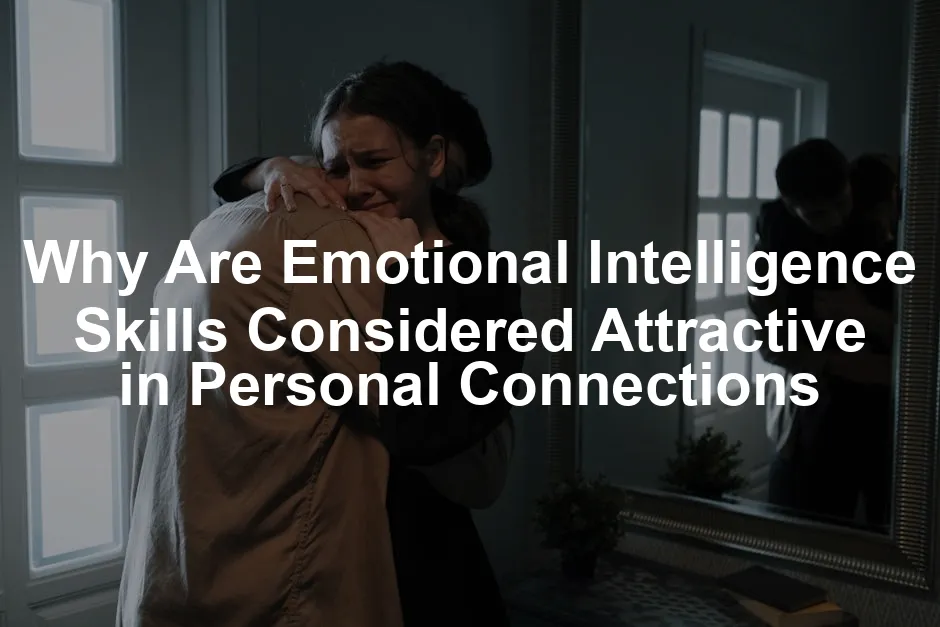
Why Are Emotional Intelligence Skills Considered Attractive in Personal Connections
Introduction
Emotional intelligence (EI) is the ability to understand and manage emotions. In personal relationships, high EI fosters empathy and connection. People find emotionally intelligent individuals appealing because they navigate emotions effectively. Exploring this topic helps improve our personal connections and enriches our interactions.
Speaking of emotional intelligence, if you’re looking for a comprehensive guide, check out “Emotional Intelligence 2.0” by Travis Bradberry. This book is like having a personal trainer for your emotions, guiding you to lift those emotional weights with ease!
Summary and Overview
Emotional intelligence encompasses five key components: self-awareness, self-regulation, empathy, social skills, and motivation. Each component plays a vital role in personal relationships. Self-awareness allows individuals to recognize their own emotions, while self-regulation helps manage emotional responses. Empathy enables understanding others’ feelings, enhancing connection. Strong social skills support effective communication, while motivation drives personal growth.
Emotionally intelligent individuals often foster deeper connections and enrich relationship satisfaction. They create environments of trust and openness, where others feel valued. Developing EI skills can lead to improved conflict resolution, better communication, and increased relationship satisfaction. As we cultivate emotional intelligence, we enhance our ability to connect meaningfully with others.

If you want to dig deeper into how EI influences management, consider reading “The Emotionally Intelligent Manager” by David R. Caruso. This book can turn your managerial skills from zero to hero faster than you can say ’emotional quotient’!
The Appeal of Emotional Intelligence in Personal Relationships
Understanding Emotional Intelligence
Emotional intelligence refers to our capacity to recognize, understand, and manage emotions. Key components include self-awareness, self-regulation, empathy, social skills, and motivation. Daniel Goleman popularized the concept in the mid-90s, highlighting its significance in relationships.
Research shows a strong correlation between high emotional intelligence and successful relationships. For instance, studies suggest that couples with higher EI experience greater satisfaction. Individuals with high emotional intelligence can interpret emotions and nonverbal cues accurately. This ability leads to enhanced understanding and connection, making them more attractive in personal relationships.
Emotional intelligence, often measured as emotional quotient (EQ), is crucial in interpersonal relationships. Those who master self-regulation can handle conflicts calmly, while strong empathy fosters deeper emotional bonds. The appeal of emotionally intelligent partners lies in their ability to create harmony and understanding, essential for healthy relationships.

Want to boost your empathy skills? Check out “The Empathy Effect” by Helen Riess. It’s like a how-to manual for understanding others, and who doesn’t want to be everyone’s favorite therapist?
The Role of Empathy in Attraction
Empathy plays a vital role in building connections. It allows individuals to understand and share the feelings of others. When you show empathy, you demonstrate that you care about another person’s emotions. This creates a bond that fosters trust and intimacy.
Empathy differs from sympathy. Sympathy involves feeling pity for someone’s misfortune. In contrast, empathy is about putting yourself in their shoes. For example, if a friend loses a job, sympathy might lead you to say, “I’m sorry that happened.” Empathy encourages you to ask, “How are you feeling about this?” This approach invites deeper conversations.
Research shows that empathy significantly impacts relationship satisfaction. A study in the Journal of Family Psychology found that couples with high empathy report greater happiness. Empathetic listening, where you attentively engage with someone’s feelings, enhances emotional connections. In conflicts, empathy helps to de-escalate tension and allows for more constructive resolutions.
Ultimately, being empathetic not only strengthens relationships but also makes you more attractive to others. People are drawn to those who understand and validate their emotions, leading to richer, more fulfilling connections.

To further develop your empathetic skills, consider adding some tools to your toolkit, like Empathy Cards for Conversation. These cards can help spark deeper discussions and make you the go-to friend for emotional support!
Self-Awareness and Relationship Growth
Self-awareness is crucial for personal growth and healthier relationships. By recognizing and understanding your emotions, you can respond more thoughtfully to others. This insight allows for improved communication and helps avoid misunderstandings.
When you practice self-reflection, you gain clarity about your feelings. For instance, if you often feel anger during disagreements, understanding this trigger enables you to manage it better. This awareness fosters emotional regulation, which can lead to more productive discussions.
Studies show a direct link between self-awareness and relationship success. Individuals with high self-awareness are better at managing conflicts and expressing their needs. They tend to take accountability for their actions, creating a more harmonious environment.
The impact of self-awareness extends beyond personal interactions. It also enhances your ability to connect with others. By acknowledging your feelings, you create space for authentic conversations. This openness encourages others to share their emotions, building stronger bonds over time.

In summary, developing self-awareness is a powerful tool for enhancing relationships. It not only promotes personal growth but also cultivates deeper connections with those around you.
For those looking to kickstart their self-awareness journey, consider using a “Mindfulness for Beginners” by Jon Kabat-Zinn. This book is a great entry point for anyone looking to understand their inner landscape and improve their relationships.
Social Skills: The Bridge to Stronger Connections
Social skills significantly influence relationship dynamics and attraction. They encompass effective communication and active listening, which are crucial for meaningful interactions. When you engage with others, your ability to understand social cues can enhance rapport and trust.
Non-verbal communication plays a significant role in how messages are received. Your body language, eye contact, and tone of voice can convey empathy and openness. For example, leaning in during a conversation signals that you’re engaged and interested. This fosters a sense of connection.
Research highlights the importance of communication in relationship satisfaction. A study found that couples who communicate effectively experience higher levels of intimacy and lower conflict rates. Practicing active listening—really focusing on what others say—helps to strengthen these connections.
Moreover, building rapport is essential. When you take the time to understand someone’s perspective, it creates an emotional bond. This bond encourages openness, allowing for deeper conversations and mutual support.

In essence, strong social skills serve as a bridge to richer relationships. By honing these skills, you enhance the quality of your interactions and cultivate lasting connections.
If you’re looking to improve your social skills further, consider an Emotional Intelligence Training Kit. This kit is like a gym membership for your social skills—minus the sweat!
Emotional Regulation: Keeping Calm Under Pressure
Emotional regulation is essential for relationship harmony. When emotions run high, conflicts can escalate quickly. By managing our emotions, we promote understanding and empathy. This calmness creates a safe space for open communication.
One effective technique for emotional regulation is mindfulness. Practicing mindfulness helps you stay present and aware of your emotions. When you notice your feelings, you can respond thoughtfully instead of reacting impulsively. This approach enhances stress management and conflict resolution.
Research shows a direct link between emotional regulation and relationship durability. Couples who manage their emotions effectively report greater satisfaction. They experience fewer misunderstandings and navigate disagreements with grace. High emotional intelligence in this area fosters stronger bonds and deeper connections.

Overall, emotional regulation is a skill worth developing. It not only improves your relationships but also contributes to personal well-being and resilience. By practicing mindfulness and other strategies, you can nurture a calm and loving environment.
To help you with mindfulness, consider getting a Meditation Cushion. It’s the perfect throne for your mental kingdom, ensuring you’re comfortable while you conquer your thoughts!
The Benefits of High Emotional Intelligence in Dating
High emotional intelligence significantly enhances dating experiences. Emotionally intelligent partners are often perceived as more desirable. They tend to understand emotions better and communicate effectively, making connections more profound.
Attributes that make these individuals attractive include strong empathy, active listening, and self-awareness. They can navigate emotional landscapes, ensuring their partner feels valued and understood. This depth fosters attraction and romance.
Surveys reveal that many people prefer partners with high emotional intelligence. A large percentage of individuals believe that empathy and emotional understanding are vital traits in relationships. These qualities lead to healthier dynamics and greater intimacy.

In dating, emotional intelligence plays a pivotal role. It helps partners connect on a deeper level, fostering trust and mutual respect. As a result, emotionally intelligent individuals often enjoy more successful and fulfilling relationships.
If you’re wondering how to communicate better in your relationships, check out “Crucial Conversations” by Kerry Patterson. This book will equip you with the tools to navigate those tricky discussions like a pro!
Understanding emotional triggers is essential for managing stress in relationships. why is understanding emotional triggers important for stress relief
How to Cultivate Emotional Intelligence
Cultivating emotional intelligence is a transformative journey. Start with practical exercises like journaling about your feelings. This practice encourages self-reflection and helps you identify emotional triggers.
Seeking feedback from trusted friends or partners is another effective strategy. Their insights can reveal blind spots and areas for improvement. Attend workshops or read books focusing on emotional growth to deepen your understanding.
Mindfulness exercises can also enhance your emotional intelligence. These techniques promote awareness of your emotions and reduce stress. Remember, developing emotional intelligence is a lifelong process. Regular practice and commitment can lead to significant personal growth and stronger relationships.

By investing in your emotional intelligence, you empower yourself to navigate life’s challenges with grace. This growth enhances your connections with others, leading to more meaningful interactions and fulfilling relationships.
For a more hands-on approach, consider using an Emotional Intelligence Workbook. This workbook can guide you through exercises that will help solidify your understanding and application of EI!
Conclusion
Emotional intelligence (EI) enhances personal connections in remarkable ways. It fosters empathy, effective communication, and understanding. These qualities make emotionally intelligent individuals highly attractive in relationships. They are more likely to navigate conflicts gracefully and maintain trust.
By investing in emotional intelligence, you can transform your relationships. It empowers you to connect on a deeper level, enriching your interactions. Developing these skills leads to greater satisfaction and harmony in your personal life. So, take the time to cultivate your emotional intelligence. Your relationships will flourish as a result.

And hey, if you’re looking for something to help you relax while enhancing your emotional intelligence, check out some Stress Relief Essential Oils. They can create a calming atmosphere while you work on those emotional skills!
FAQs
What is emotional intelligence and why is it important in relationships?
Emotional intelligence (EI) is the ability to recognize and manage emotions, both your own and those of others. It is vital in relationships because it fosters understanding, reduces conflicts, and enhances communication. Higher EI leads to healthier, more fulfilling connections.
How can emotional intelligence improve my dating life?
Emotional intelligence enhances dating by promoting better communication and deeper connections. With high EI, you can express your feelings clearly and understand your partner’s emotions. This leads to more meaningful interactions and a stronger bond.
What are some signs of high emotional intelligence in a partner?
Signs of high emotional intelligence include active listening, empathy, self-awareness, and the ability to handle conflicts calmly. Emotionally intelligent partners also show vulnerability and are open to discussing feelings, making communication easier.
Can emotional intelligence be developed over time?
Yes, emotional intelligence can be cultivated through practice and awareness. Engaging in self-reflection, seeking feedback, and participating in workshops can help you improve your EI skills over time.
What role does empathy play in emotional intelligence?
Empathy is a core component of emotional intelligence. It allows you to understand and share the feelings of others, fostering deeper connections. Empathy enhances communication and helps resolve conflicts, making it essential for successful relationships.
Please let us know what you think about our content by leaving a comment down below!
Thank you for reading till here 🙂
All images from Pexels




